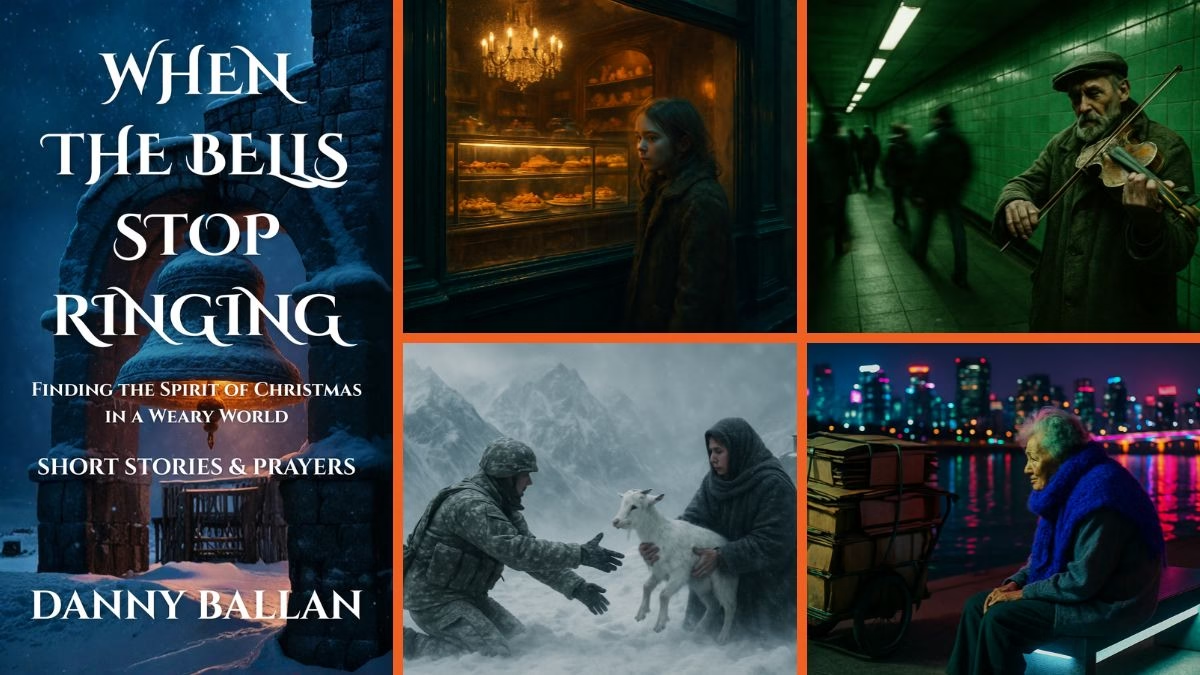You know, there is a specific kind of walk we all adopt in December. Have you noticed it? It’s not just a walk; it’s a posture of defense. Shoulders up to the ears, chin tucked into the scarf, hands jammed deep into pockets. We walk faster. We have a destination. We have a warm room waiting for us, a meeting to get to, a list of things to buy that is longer than our patience.
And because we are moving so fast, and because we are so focused on preserving our own heat, the world around us starts to blur. It becomes a backdrop. The buildings, the traffic, the people standing still—they all become scenery.
I’ve been thinking a lot lately about that blur. Specifically, I’ve been thinking about the things—and the people—we edit out of our vision just so we can get through the day comfortably.
We looked at four stories this week. Four very different places—Paris, Prague, the Caucasus Mountains, and Seoul. But if you strip away the geography, if you take away the Eiffel Tower and the Han River, you realize these aren’t stories about travel. They are stories about the “Blur.” And more importantly, they are stories about the terrifying, wonderful moment when the Blur snaps into focus and becomes a person.
Let’s start with that window in Paris. You remember Chloé? The girl outside the pâtisserie?
We all know that window. Maybe it’s not a bakery for you. Maybe it’s a restaurant, or a living room with the curtains drawn open, or just the screen of your phone scrolling through someone else’s perfect holiday photos.
There is a profound psychology to glass. It’s a fascinating material. It allows us to see, but it prevents us from touching. It separates the “In” from the “Out” without blocking the view. And for Chloé, standing on the wet cobblestones, that glass was the hardest border in the world.
On one side, there is gold light, butter, sugar, and warmth. On the other side, there is gray dampness, exhaust fumes, and hunger.
Now, here is the question I’ve been wrestling with: Why is it so hard to open the door?
I don’t mean physically. The door isn’t locked. But psychologically, that door is reinforced with steel. We are terrified of the draft.
Think about how we usually do charity. We are comfortable giving “out.” We hand a coin through a cracked car window. We drop a bag of old clothes in a bin. We donate online. These are good things—don’t get me wrong. But notice the direction of the flow. It is always outward, and it always maintains the barrier. I am here, you are there, and I will send something across the gap to you.
It keeps us safe. It keeps our floors clean. It keeps our hearts from getting too involved.
But Madame Lefèvre in the story… she did something dangerous. She didn’t send a stale baguette out to the street. That’s what we expect, right? The “leftover” charity. Here, take this thing I was going to throw away anyway. That is the transaction of the superior to the inferior.
No, she opened the door and said, “Come in.”
And then—and this is the detail that really gets to me—she served the hot chocolate in porcelain.
Do you know how radical that is? To serve a homeless child in the good china?
Porcelain is breakable. Porcelain is for guests. Porcelain says, “I trust you with something valuable.”
When we offer dignity instead of just charity, we are leveling the playing field. And that is scary. Because if I acknowledge that the person shivering on the street is worthy of the porcelain cup, then I have to acknowledge that the only difference between me and them is luck. Just a roll of the dice.
We like to think we earned our warmth. We tell ourselves stories about our hard work and our smart choices. And sure, those play a part. But standing in front of that bakery window, the only difference between Chloé and the boy Luc inside was which side of the door they were born on.
Madame Lefèvre didn’t just feed a girl; she shattered the glass. She said, “You belong in the warmth, too.”
And I have to ask myself—when was the last time I did that? Not just gave money, but gave space? When was the last time I invited the “out” to come “in”? It’s a risky business, opening the door. You let the cold in. You risk the dirt. But I suspect that’s the only way to keep our own hearts from freezing over.
And speaking of freezing… let’s move from the eyes to the ears. Let’s talk about Prague.
The story of Karel, the violinist in the metro, hits on something that I think we all feel but are afraid to admit: The tyranny of forced joy.
December is a noisy month. It is aggressively happy. The songs in the shops, the commercials on TV, the greetings we exchange—everything is commanding us to be merry. ‘Tis the season to be jolly.
But what if you’re not?
What if your year was a disaster? What if you lost your job in November? What if the chair at the head of the table is empty for the first time?
Grief doesn’t look at the calendar. Sadness doesn’t respect bank holidays.
Karel is standing in that metro tunnel, playing his heart out, and the commuters are rushing past him because he is an interruption. He is a reminder of something they don’t want to feel. He is not necessarily playing the expected jingles of the season.
We are terrified of sadness in public spaces, aren’t we? If we see someone crying on a bus, our first instinct is usually to look away. We treat grief like it’s contagious. Don’t look, or you might catch it.
But then the businessman stops.
Here is a man who, by all accounts, is winning at life. Expensive suit, cashmere coat, high-powered job. He fits the aesthetic of success. But inside, he is crumbling. And he doesn’t stop for a happy song. He stops to ask Karel to play a sad one.
There is a profound philosophical concept here about the “Release Valve.”
We build these pressure cookers of expectation. We have to buy the right gifts, cook the perfect meal, smile at the annoying relatives, and post the perfect picture. The pressure is immense. We are all walking around that metro station holding our breath.
Karel offered the businessman permission to exhale.
He played the grief that the man couldn’t speak.
I wonder if that’s what we’re missing sometimes. We try so hard to “cheer people up.” You see someone down, and you say, “Oh, don’t worry, it’ll get better,” or “Look on the bright side!”
Why do we do that? Why are we so quick to plaster over the cracks?
Maybe the most compassionate thing we can do isn’t to cheer someone up, but to witness them being down. To stand in the tunnel with them, amidst the screeching trains and the cold wind, and say, “I hear you. It sucks. And I’m standing here with you.”
Karel didn’t offer advice. He didn’t offer a solution. He offered a song in a minor key. And for that businessman, that song was a lifeline.
It makes me wonder… how many of us are walking around with a melody of grief stuck in our throats, just waiting for someone to play the first note so we can finally let it out?
Now, let’s push this idea of connection even further. Let’s take it to the extreme. Let’s go to the mountains.
The story of Levan and the woman on the border is about the lines we draw in the dirt.
We are obsessed with lines. This is my property, that is yours. This is my country, that is yours. This is my ideology, that is yours. We defend these lines with fences, with laws, and, in Levan’s case, with rifles.
It’s easy to hate an enemy when they are a concept. When they are just a shape in the distance, a dot on a map, or a stereotype on the news. It’s easy to pull a trigger on an idea.
But what happens when the idea stumbles? What happens when the “Enemy” becomes a freezing grandmother chasing a goat?
The wind in that story is important. The cold doesn’t care about the border. The snow buries the line. Nature has a way of mocking our politics, doesn’t it? A blizzard treats a general and a private exactly the same.
Levan faces a choice that is the fundamental choice of the human experience: Protocol or Person?
His orders are clear. Defend the line. But his humanity is louder.
I love the moment with the canteen. That, to me, is the crux of the whole thing. He drinks from the canteen, the same canteen he hands to her. She drinks, and hands it back and then he drinks.
Think about the intimacy of that. Sharing water. Placing your mouth where the “enemy” placed theirs. It dissolves the separation. You cannot hate someone while you are sharing a drink of water with them in a blizzard. It is biologically impossible. The shared survival instinct overrides the learned hostility.
We live in a time of intense polarization. I don’t need to tell you that. We are constantly told who our enemies are. We are told who is on the “Wrong Side” of the line.
But I wonder… if we were stuck on a mountain ledge in a storm, how long would those labels last? Ten minutes? Five?
The story suggests that our divisions are actually very fragile. They require constant maintenance. We have to keep reminding ourselves to hate. We have to keep polishing the propaganda.
But kindness? Kindness is elemental. It’s waiting right underneath the surface. It just needs an excuse to break through—like a trapped goat or a shared thirst.
Levan gave the woman water. She gave him dried apricots.
That trade—water for fruit—is the oldest economy in the world. It predates nations. It predates money. It is the economy of “I help you, you help me, because otherwise, we both die.”
Maybe we need to spend less time drawing lines on the map and more time walking out into the No Man’s Land to see who is stumbling through the snow. Because usually, it’s not an invading army. It’s just a neighbor trying to keep their life together.
And finally, let’s talk about Min-ji and the Indigo Scarf.
This one… this one hurts a little, doesn’t it? Because we see Min-ji every day.
We see the elderly person collecting cans. We see the person pushing the cart. We see the homeless veteran on the corner.
And what do we see? Be honest.
We see the poverty. We see the grime. We see a “social issue.” We see a cautionary tale.
We judge people by their current coordinates. We look at where they are standing right now and we assume that is who they are.
But Min-ji isn’t just a cardboard collector. She is a library. She is a museum of a life lived. She was a bride in silk. She was young. She had dreams, heartbreaks, triumphs.
The tragedy of poverty isn’t just the lack of money; it’s the erasure of history. It strips away the complexity of a person until they are just a flat, one-dimensional object of pity.
When the student, Jun-ho, offers her money, he is reacting to the flat image. He sees “Poor Woman.” He offers “Coin.” It’s a reflex.
But when he sits down… when he actually stops the momentum of his own life to sit on that bench… he learns the truth. He learns about the Indigo.
And then he does something magnificent. He goes and buys a scarf. But not just a warm scarf. An indigo scarf.
He buys a gift for the Queen, not for the Pauper.
That is a distinction that changes everything.
When we give generic charity, we are addressing the need. You are hungry, here is bread.
When we give specific generosity, we are addressing the soul. I heard you. I know who you are. Here is something that honors your specific history.
Imagine how Min-ji felt wrapping that scarf around her neck. It wasn’t just wool keeping the wind out. It was a validation of her existence. It was someone saying, “I believe you. I believe you were beautiful. I believe you matter.”
We are all walking around carrying these invisible histories. The grumpy cashier at the grocery store? Maybe she’s a former pianist whose arthritis stopped her from playing. The guy who cut you off in traffic? Maybe he’s rushing to a hospital. The quiet man in the office who never speaks? Maybe he writes poetry in his spare time that would break your heart.
We don’t know. We assume the surface is the substance.
But if we ask… if we sit on the bench for just five minutes and ask, “Who were you before this winter came?”… we might find that we are surrounded by royalty in disguise.
So, what do we do with all this?
We have a window, a violin, a mountain, and a scarf.
They all point to the same thing: The Interruption.
We value flow. We value speed. We value getting things done. But humanity happens in the interruption.
It happens when you stop to open the door. It happens when you stop to listen to the sad song. It happens when you step out of the guard post. It happens when you sit on the bench.
It is inconvenient to be kind. Let’s just admit that. It takes time. It takes emotional energy. It messes up your schedule.
Madame Lefèvre probably had a million things to do in that bakery. But she stopped.
The businessman probably missed a train to listen to Karel. But he stopped.
Levan risked a court-martial to help that woman. But he stepped out.
Jun-ho risked being late for his exams. But he sat down.
The “What If” question for today is this: What if the interruption is actually the point?
What if the thing you are rushing toward is less important than the person you are rushing past?
We are building these invisible walls everywhere. We build them with our headphones. We build them with our smartphones. We build them with our political affiliations. We build them with our busy schedules.
We build them because we are afraid. We are afraid that if we let the world in, it will hurt. We are afraid that if we look too closely at the homeless woman, we will see our own mother, or ourselves. We are afraid that if we listen to the grief, we will fall apart.
So we stay behind the glass. We stay warm. We stay safe.
But we also stay alone.
The warmth that Chloé felt in the bakery wasn’t just the radiator. It was the warmth of being known. The peace the businessman felt wasn’t just the music; it was the peace of being understood. The relief the woman felt on the mountain wasn’t just the water; it was the safety of being seen as a human. And the dignity Min-ji felt wasn’t just the wool; it was the respect.
This week, as you go about your “December Walk”—that fast, head-down, defensive power-walk—I challenge you to look for the cracks in the wall.
Look for the person standing on the other side of the glass. Look for the history hidden under the gray coat.
And if you get the chance, be the one who unlocks the door. Be the one who offers the porcelain cup. Be the one who buys the indigo scarf.
Because the truth is, we are all just walking each other home in the dark. And the road is a lot less frightening when someone else is holding the light.
Think about it.
I’ll catch you in the next one.











0 Comments